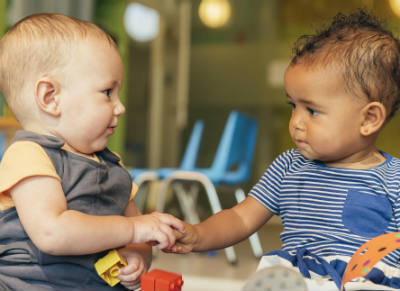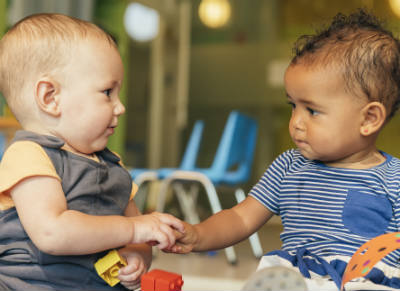When your children are young, you want them to make friends and otherwise learn how to engage with people around them. You want them to learn how to cooperate and work well with others – and, as they grow, their need for quality social skills only continues to increase. He or she will need to learn how to give and receive respect and advocate for himself or herself. Social skills help with developing self-confidence, independence and negotiating skills, along with the ability to plan for the future.
So, how can you help your children learn these vital skills? Here are four tips for teaching social skills.
Teaching Social Skills to Kids: Tip No. 1: Be a Good Role Model
An article in ParentingScience.com offers “Evidence-based ideas to help kids communicate, connect, empathize and read minds.” At the top of their long list of suggestions, the article mentions the importance of parents being good role models. To fulfill this crucial role, you can start by talking to your child when you see someone in distress. This person can be real – or a character in a book or television show. Even a brief empathetic conversation with your child can help. You can find more information here.
Teaching Social Skills to Kids: Tip No. 2: Encourage Toddlers to Take Turns
ParentingScience.com also recommends you have your toddler “engage in playful acts of reciprocity.” These can include rolling a ball back and forth with another person, taking turns pressing a toy button or even simply handing a toy to one another. In a study where an adult previously unknown to the child participated in this type of play, the toddlers began to “respond to their new playmate as a person to help and share with.” In contrast, when a toddler played next to a stranger, this effect didn’t take place.
Teaching Social Skills to Kids: Tip No. 3: Right-Size Your Expectations of Social Competence
Parents.com published an article with of a list of what social skills and cues are reasonable to see at certain ages. Your child, when two to three years old, will likely say “hi” and “bye” to people as part of his or her social actions. By the ages of three and four, he or she should be able to take turns during gameplaying and use actual words when starting a conversation with adults. When four to five, your child should be able to cooperate more easily with other children.
By the time your child is five or six, it’s likely that he or she is understanding the foundations of good sportsmanship as well as the usage of “Please,” “Thank you” and “I’m sorry.” By six or seven, your child should be better at sharing and more able to empathize with other people, perhaps crying when something sad happens. The article notes, though, how children of this age still “can’t understand the clear difference between right and wrong.”
Knowing the typical development of social behavior and what behaviors to expect helps you, as a parent, to set reasonable expectations for your child and to help him or her along to the next stage of social competence.
Teaching Social Skills to Kids: Tip No. 4 Help to Shape the Concept of Friendship
If your child comes home from preschool, for example, and says he has no friends, it’s important to step back and help your child to identify friendships, according to an article in Education.com. Assist your child in thinking of situations when he needed help. Who helped him? That person is a friend. Guide him along the process of thinking about when he wasn’t feeling good. Who helped? Who has come over to play? This helps your child to identify friendships.
Overall, developing appropriate social behavior is key to your child living a healthy, full-rounded life. We encourage you read all the articles cited in full to assist you in teaching social skills to your children in the 21st century.




